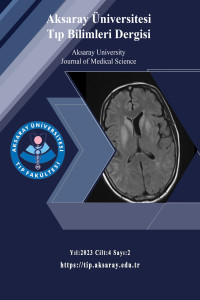Abstract
Giriş: Bazal ganglionlar perfüzyon sınır bölgesinde yer almaları nedeni ile akut ve kronik hipoksik-iskemik durumlara oldukça duyarlı bölgelerdir. Yapılan çalışmalar hipoksinin PH gibi nörodejeneratif hastalıklara yol açabildiğini göstermiştir. Anafilaksi böcek ısırması, arı sokması nedeni ile oluşabilen, birçok organın etkilendiği, ölüm ve hipoksi ile sonuçlanan hipersensitivite reaksiyonudur. Biz de arı sokması nedeni ile anafilaksi ve kardiak arrest gelişen, taburcu edildikten sonra takiplerinde parkinsonizm gelişen bir olguyu nadir görülmesi nedeni ile sunmayı planladık.
Olgu: 58 yaşında erkek hasta, arı sokması, anaflaksi sonrası kardiak arrest gelişen hasta 1 haftalık entübasyon süresinden sonra extübe edilmiş. Sonrasında hareketlerde yavaşlama, REM uyku davranış bozukluğu ve unutkanlık şikayeti olması üzerine tarafımıza konsülte edildi. Nörolojik muayenede bradimimi, solda daha belirgin bilateral bradikinezi, bilateral rijidite tespit edildi. Adım aralığının daralmış, postüral instabilitenin pozitif olduğu tespit edildi. Yapılan nöropsikolojik testte özellikle yürütücü işlevlerde bozulma olduğu görüldü. Yapılan kranial MR görüntülemesinde bilateral nukleus kaudatus, putamen ve globus pallidusta T2 ve T2 flair simetrik hiperintens lezyon olduğu izlendi. Donepezil ve levodopa tedavisi başlanıldı, tedaviden kısmen fayda gören hasta poliklinik kontrolüne alındı.
Sonuç: Bazal ganglion fonksiyonunu bozan, dopaminerjik nöron işleyişine hasar veren tüm durumlar parkinsonizm tablosuna yol açabilmekte olup tanı ve tedavi yönetimi zor olmaktadır. Gelecekte raporlanacak daha çok vaka ile tanı için kesin kriterler belirlenebilecek ve daha net tedavi planları yapılabilecektir.
ABSTRACT
Introduction: Basal ganglias are very sensitive regions at acute and chronic hypoxic-ischemic conditions because of their location in the border of the perfusion region. Studies have shown that hypoxia can lead to neurodegenerative diseases such as Parkinson’s disease. Anaphylaxis is the most severe systemic hypersensitivity reaction that can be caused by a number of triggers and conditions like bee sting and can result in cardiac arrest and death. We aimed to present a case who developed anaphylaxis and cardiac arrest due to bee sting and developed parkinsonism in the follow-up after discharge because of its rarity.
Case: A 58-year-old male patient, who developed cardiac arrest after bee sting and anaphylaxis, was extubated after a 1-week intubation period. Afterwards, the case was consulted to us since there are complaints of slowing movements, REM sleep behavior disorder and amnesia. He has bradymymia and bilateral bradykinesia and rigidity more prominent on the left was revealed in neurological examination. It was determined that the step interval was narrowed and the postural instability was positive. It was seen that especially executive functions were impaired in the neuropsychological test. Cranial MRI showed bilateral nucleus caudatus, T2 and T2 flair symmetric hyperintense lesion in the putamen and globus pallidus. Donepezil and levodopa treatment were started. He has benefited partially from the treatment.
Keywords
References
- Tysnes, O.B., Storstein, A. Epidemiology of Parkinson’s disease. J. Neural Transm. 2017;124, 901–905. doi: 10.1007/s00702-017- 1686-y.
Abstract
References
- Tysnes, O.B., Storstein, A. Epidemiology of Parkinson’s disease. J. Neural Transm. 2017;124, 901–905. doi: 10.1007/s00702-017- 1686-y.
Details
| Primary Language | Turkish |
|---|---|
| Subjects | Clinical Sciences |
| Journal Section | Olgu Sunumu |
| Authors | |
| Publication Date | September 30, 2023 |
| Submission Date | March 19, 2023 |
| Acceptance Date | May 4, 2023 |
| Published in Issue | Year 2023 Volume: 4 Issue: 2 |


